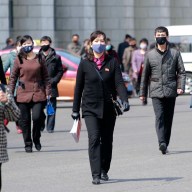 Hey, it’s Robin Williams as Eisenhower (opposite Forest Whittaker) in “Lee Daniels’ The Butler.”
Hey, it’s Robin Williams as Eisenhower (opposite Forest Whittaker) in “Lee Daniels’ The Butler.”
Credit: The Weinstein Company
‘Lee Daniels’ The Butler’
Director: Lee Daniels
Stars: Forest Whittaker, Oprah Winfrey
Rating: PG-13
3 (out of 5) Globes
A bizarre copyright lawsuit has forced the makers of “The Butler” to put director Lee Daniels’ name in the title. The irony is that it’s the least Lee Daniels movie of the four he’s directed. Plowing through the career of Cecil (Forest Whittaker), an African American who served as Butler from Eisenhower (Robin Williams!) to Reagan (Alan Rickman!!), it’s not crazy like past Daniels. (Certain casting choices aside.) It’s more distinguishable as the work of Danny Strong, the screenwriter who reduced the presidential elections of 2000 (“Recount”) and 2008 (“Game Change”) into dubious HBO movie entertainments.
Strong’s script is similarly reductive in some ways yet, rather unexpectedly, less reductive in ways that actually count. Despite being a look at civil rights and race relations written by a white guy, this isn’t a history lesson made to comfort white liberals. It doesn’t even have a soothing, readymade message. It’s a dialectic, exploring two warring approaches to race relations — not from the white side, but among African Americans.
In one corner is Whittaker’s Cecil. He has decided the way to change things is quietly and subversively from within. In the other corner is Louis (David Oyelowo), Cecil’s son, who comes of age during the era of sit-ins. He believes in activism (if not the violent kind), and father and son clash mightily over their contradictory tactics to achieve the same goal.
This is in no way subtle, but the key is that it doesn’t pick a side. There are times when Cecil’s approach seems more appropriate, and times when it seems ineffective, even foolish. Ditto Louis’ side. Ultimately thesis and antithesis form a wobbly synthesis, at which point the film collapses. But it’s refreshing to see a blunt history lesson embrace complexity at all.
Also importantly, this is still at least somewhat a Lee Daniels picture, which is a good thing. Daniels is a refreshingly sloppy, often crazy filmmaker, whose “prestige” picture (“Precious”) is frothing mad in look and feel. Here he’s restrained, particularly compared to the absurdly lurid “The Paperboy” — but not that restrained. Only Daniels would think to cast John Cusack as Nixon (or “Hanoi” Jane Fonda as Nancy Reagan), though he makes himself known in more productive ways in the forcefulness of the protest set pieces. A sit-in scene in a diner has a real force, even for a sit-in scene, while the more crazy side of Daniels can be found in any scene where Oprah Winfrey, as Cecil’s long-suffering wife, gets drunk and rants or dances to “Soul Train.” Daniels is a reckless director, but he’s the perfect person to loosen up a script that can be as stiff as it is smart.











